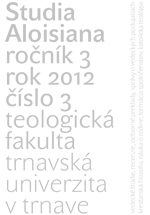Špecifiká sociálneho evanjelia v nescudziteľnom aspekte teologickej interpretácie II. Rozlíšenie v prizme akademickej roviny a nahliadania na svedomie a obsah pojmu parrhesia
Particularities of Social Gospel in Inalienable Aspect of Theological Interpretation II. Discernment in a Prism of the Academic Level and in the Looking into Conscience and the Content of Notion Parrhesia
Author(s): Ivan KútnySubject(s): Christian Theology and Religion, Philosophy, Social Sciences, Theology and Religion
Published by: Teologická fakulta Trnavskej univerzity
Keywords: conscience;the man like a subject; theological interpretation; parrhesia;
Summary/Abstract: In the introduction the author summarises the knowledge of the former first part of the contribution and consequently in relation with the conscience of man and with the content of notion parrhesia. He has the intention to focus more explicitly his attention on some particularities of Catholic social theory. He is referring to the texts of selected magisterial documents of Catholic Church of last decades, including the documents of the Second Vatican Council. He focuses on theological-spiritual aspect of intersection in the act of spiritual subject and consequently on moral aspect in prism of revealed moral and conscience. He mentions that the subject who has a spiritual nature and who realises himself in interpersonal relations is invited and made capable by the Creator to the continual revision of the knowledge. And it is just in this point that he opens the new questions, for example: Is the man living in contemporary society really guided and co-educated to the value of authenticity, to the attitude of truthfulness as such and in connection with the fellow and the common good? He accentuates that the three-personal God – the God of the Bible – who found good to reveal himself and let know the mystery of his will doesn’t reveal in the first place certain codex, but himself. As the work of Revelation come into realization by acts and words it is possible to assert that “all acts by which the God reveal himself have the moral dimension”. The magisterial texts of Catholic Church are not once deliberating about the conscience which has the task to mediate the objective and universal norms into the concrete and particular situations. However, if we perceive the task of the conscience more into the specific of singular and non-recurring internal experience of human subject with his Creator letting himself known in the twofold experience of religious dimension of faith and of the theologal aspect of love, then, apparently, there might not be a problem either with acquiring and applying, or with respecting and protecting the liberty of conscience – always in symbiosis with the content of notion parrhesia.
Journal: Studia Aloisiana
- Issue Year: 3/2012
- Issue No: 3
- Page Range: 21-31
- Page Count: 11
- Language: Slovak

